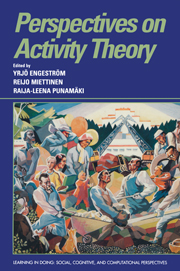Book contents
- Frontmatter
- Contents
- List of contributors
- Series foreword
- Introduction
- Part I Theoretical issues
- 1 Activity theory and individual and social transformation
- 2 The content and unsolved problems of activity theory
- 3 Knowledge as shared procedures
- 4 Activity theory in a new era
- 5 Society versus context in individual development: Does theory make a difference?
- 6 Cultural psychology: Some general principles and a concrete example
- 7 Laws, logics, and human activity
- 8 Collapse, creation, and continuity in Europe: How do people change?
- 9 Activity theory and the concept of integrative levels
- 10 The relevance to psychology of Antonio Gramsci's ideas on activity and common sense
- Part II Language and its acquisition
- Part III Play, learning, and instruction
- Part IV Technology and work
- Part V Therapy and addiction
- Author index
- Subject index
4 - Activity theory in a new era
Published online by Cambridge University Press: 05 June 2012
- Frontmatter
- Contents
- List of contributors
- Series foreword
- Introduction
- Part I Theoretical issues
- 1 Activity theory and individual and social transformation
- 2 The content and unsolved problems of activity theory
- 3 Knowledge as shared procedures
- 4 Activity theory in a new era
- 5 Society versus context in individual development: Does theory make a difference?
- 6 Cultural psychology: Some general principles and a concrete example
- 7 Laws, logics, and human activity
- 8 Collapse, creation, and continuity in Europe: How do people change?
- 9 Activity theory and the concept of integrative levels
- 10 The relevance to psychology of Antonio Gramsci's ideas on activity and common sense
- Part II Language and its acquisition
- Part III Play, learning, and instruction
- Part IV Technology and work
- Part V Therapy and addiction
- Author index
- Subject index
Summary
Introduction
In Russia currently, activity theory is being criticized wholesale by some philosophers and psychologists because it is alleged to be an expression of totalitarian ideology. Among these critics are people who were themselves not long ago advocates of activity theory. They are referring mainly to such versions of activity theory as those of A. N. Leont'ev (1978) and P. J. Gal'perin (1992). These conceptions are interpreted by the critics as representing humans not as creative beings but as simple executors of plans, orders, and standards imposed from outside.
These critics think that activity theory, with its stress on actions, operations, and internalization of ready-made standards of behavior and cognition, corresponds to what command socialism demanded of people, namely, to be simple executors.
I think that this criticism is justified to a certain degree. It is possible to show that some versions of activity theory (in particular the conception of Leont'ev) are one-sided. It is true that the formulation and elaboration of some ideas of this theory in the 1930s and 1940s were influenced by the ideological situation in the USSR. This, by the way, does not mean that all ideas that are ideologically stimulated and influenced must be false: Most fruitful hypotheses in the history of science were influenced by their nonscientific context.
At the same time, I only partly agree with these critics. First, not all the ideas of Leont'ev and Gal'perin are outdated.
- Type
- Chapter
- Information
- Perspectives on Activity Theory , pp. 65 - 69Publisher: Cambridge University PressPrint publication year: 1999
- 10
- Cited by



